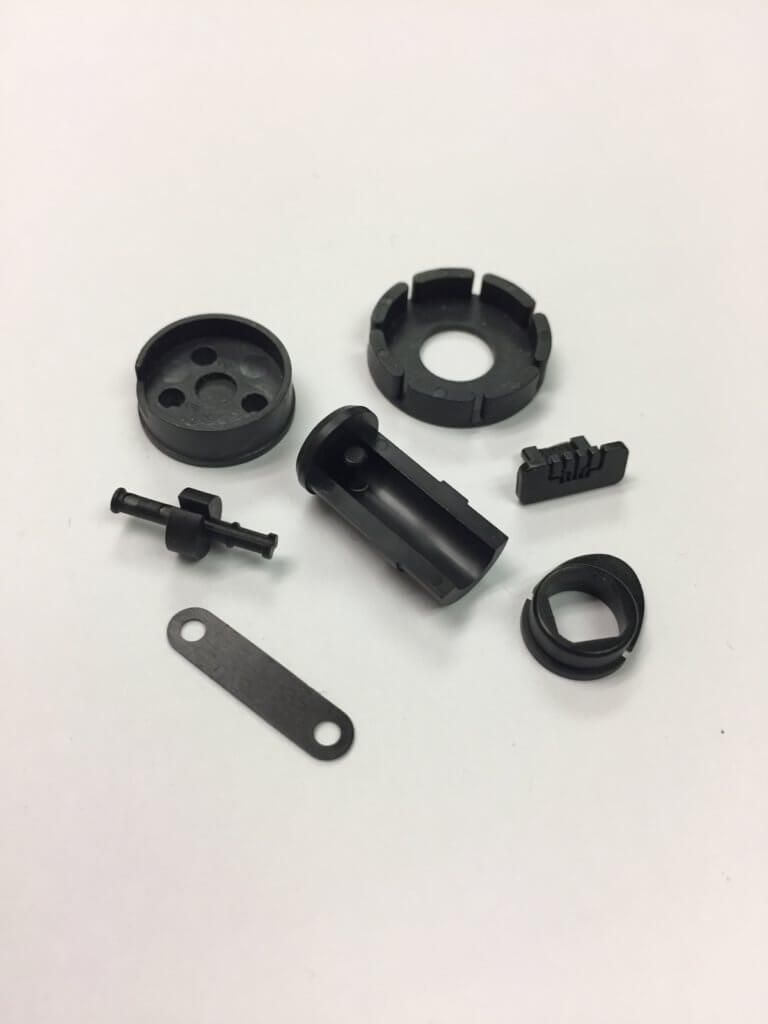One of the biggest problems associated with creating or building materials is that sometimes, standard parts don’t fit your specific application. Sometimes, the tools you need to create these parts don’t even exist.
Increasingly, manufacturers are turning to custom injection molding to create specialty parts and products that they can’t find using standard procurement methods. Custom injection molding creates high-quality parts and tools to client specifications in record time, allowing you to quickly order large volumes of materials with the confidence that they’ll be delivered on time, and without deficiencies.
Using custom injection molding results in:
- Quicker turnarounds
- High degrees of accuracy
- Opportunities to work with a wide range of materials
- Efficient automated processes
- Cost-effective production cycles
What Can You Make With Injection Molding?
A wide range of industries rely on custom injection molding to quickly produce large volumes of materials to precise specifications. This process benefits industries as varied as:
- Military & defense: Items and equipment for defense and the military must be as reliable as they are uniform. The accuracy of injection molding for these items and parts ensures high quality in everything from canteens to headsets, vehicle components to backpack fasteners, and flashlights, too!
- Food and beverage processing: Because custom injection molding works with lightweight, nonpermeable polymers, it’s perfect for creating water bottles, bottle caps, lids, and all manner of food containers.
- Medical and pharmaceutical manufacturing: Custom injection molding creates sterile housings for medical and pharmaceutical products as varied as pill containers, surgical equipment, X-ray components, test kits, and anything else that requires the use of FDA-approved medical-grade resins.
- Toy making: Custom injection molding helps create a full range of unique and innovative toys; highly accurate molds combined with plastic’s nonconductive properties make it easy to incorporate electronics into toy designs as needed.
- Consumer and commercial packaging: Packagers rely on this process to quickly create containers, cases, and housings to precise specifications.
- Furniture and other domestic product production: Custom injection molding can build lightweight, affordable consumer goods such as plastic lawn furniture, fencing/fence accessories, window clasps and seals, and kitchen appliances.
- Automotive accessory production: Automakers use custom injection molding to create many of the internal components of their vehicles, including cupholders, steering wheels, dashboards, door handles, and switches.
Custom injection molding also benefits manufacturers and assembly processes by creating unique tooling that can’t be found elsewhere. Industrial companies have ordered custom injection-molded parts for their facilities that include:
- Conveyor belt parts
- Electrical switches
- Filters
- Food processing equipment
- Specialty tools and seals
The Difference Between Injection Molding and Thermoforming
Many businesses choose between injection molding and thermoforming, another popular plastic-working process, when designing parts. While both these processes efficiently create many different plastic products, several distinctions exist between them.
Thermoforming creates materials by heating plastic sheets until they’re soft enough to easily manipulate. Manufacturers then work the warmed plastic sheet into a single-sided mold and allow it to cool. During the thermoforming process, manufacturers also use methods like pressure forming, vacuum forming, and mechanical forming as needed.
Thermoforming typically works best when creating prototypes or mass-producing large parts. Generally, products need to exceed 4’ × 4’ in size for thermoforming to be an efficient assembly method.
Custom injection molding more accurately creates smaller and more intricate parts no matter the production volume. This process is also great for designing parts that later assembly process must fit together.
While custom injection molding usually comes with higher initial costs than thermoforming, most of these costs are only associated with creating the mold. After this step, custom injection molding becomes much more cost-efficient than thermoforming, which has to repeat several processes for each individual part.
Who Benefits From Abtec’s Custom Injection Molding?
Abtec works closely with clients to develop unique molds tailored to precise specifications. Our products have appeared across the country in applications as varied as industrial process equipment, indoor and lawn furniture, and life-saving medical devices.
If you would like to learn more about how our custom injection molding services will benefit your bottom line, contact us and request a free quote today.

